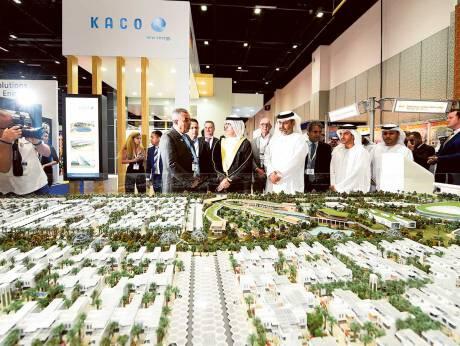The UAE remains “very optimistic” on the solar industry, the country’s undersecretary for energy said on Monday despite concerns that access to liquidity to finance projects is getting tighter.
Gulf lenders have become increasing selective over the past two years with the oil price falling from $115 a barrel in mid-2014 to around $45 today.
This change in lending attitude has raised concerns over the ability to finance projects from Jordan to Morocco. In the UAE, there are a number of solar projects under development or tender, including Dubai’s 5,000-megawatt Mohammad Bin Rashid Al Maktoum Solar Park and the 350-megawatt park in Sweihan, Abu Dhabi.
Matar Hamad Al Neyadi, the energy undersecretary, said the UAE “maintains a very optimistic outlook for solar energy”.
“The geographic and demographic profile of the Arab world makes this region a prime location for solar energy,” he said in a speech at a conference in Dubai on Monday.
He said the UAE continues to “drive development” in the Middle East and that investment in the sector would create “thousands of new career opportunities”.
The undersecretary later dismissed the suggestion that the low oil price and its impact on the finance sector had weakened the ability to finance solar projects. “It is nothing to do about the price of crude oil,” he told reporters. “That is not the reality … there is a lot of projects in the pipeline.”
And tenders do continue to be awarded. In June, Dubai Electricity and Water Authority (Dewa) awarded a Masdar-led consortium the contract to build an 800-megawatt power plant at the Mohammad Bin Rashid Al Maktoum Solar Park for a then-record low bid of US2.99 cents a kilowatt-hour, which has since been beating in Chile.
However, Paddy Padmanathan, the chief executive of private Saudi Arabian company ACWA Power, said on Monday that “liquidity is getting tighter”.
“For these type of infrastructure projects that require long-term capital we all have to continue to innovate, keep thinking about different pools of liquidity, different ways to structure it, looking at institutional investment,” he told reporters.
Padmanathan warned that the tightening liquidity meant that “we could go through a window of during which projects would inevitably start to slow”. However, he said it was more likely that lenders would increase the costs of financing for solar projects.
He also said that with more tenders expected, including from the Mohammad Bin Rashid Al Maktoum Solar Park and a “very busy year” in Saudi Arabia in 2017, that financing for regional projects is likely to start coming from investment funds.
“There is an enormous amount of money out there in the pensions industry and in the insurance industry,” he said.
Qamar Energy chief executive Robin Mills told Gulf News by email that the tightening of liquidity “may constrain the very aggressive bids made for recent solar projects, which were based partly on cheap financing.” But that it was unlikely to “stall solar progress, given the availability of alternative financing.”
Source: Gulf News











